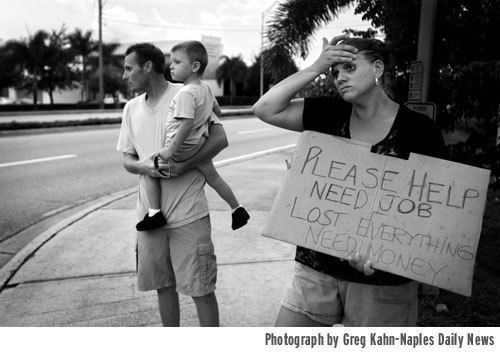Recently I was listening to an interview of author Paul Reyes about his book Photojournalism and Foreclosure, which depicts the emotional toll of the economic crisis in his home state of Florida.
During the interview, he tells the radio interviewer a story behind one photograph that showed the interior of a home left practically intact following its being foreclosed on, as if the owners had just stepped out for a short time instead of the forever they never expected.
Reyes learns the homeowner, prior to abandoning his home, had taken the time to carefully remove the name plates from literally hundreds of his son’s Karate trophies. What remain are the statues themselves, in various shapes, all void of any personal reference save for their dusty fingerprints.
When I heard this, I pictured the homeowner cradling the trophies while gently removing their shiny plaques, each inscribed with his son’s name and the name of the event for which he had won, “First Place,” “Second Place,” and so on.
How did he decide among all his other possessions that these were the ones that held the most meaning for him? I also wondered whether the homeowner had much time to decide what it was that he most wanted?
For a brief moment, it occurs to me that on a continuum of tragedy, this father was a degree “luckier” than the victims of other tragedies like the San Bruno fire that occurred just across the bay from my home. He at least had some warning time to make a decision about what it was that was meaningful to him.
What is the essence of our lives?
What captures the profound love, connection, celebration, and transformation of what it means to be who we are? What object or item represents the sum total of our lives or at least our accomplishments and which of these things would we take with us if we had to make that choice quickly?
I am still pondering that question. The obvious items float to the top of course, photo albums and pictures… but what is the essence of my life? Not an inconceivable thought considering one in five homeowners, according to one statistic I heard on public radio, are in some kind of financial trouble.
In my work as an organizing and productivity consultant, I often challenge my clients to look at the major “buckets” of their lives; to help them understand first and foremost if they are putting their time and their effort towards those activities, projects and tasks that best represent their intentions, their goals and their dreams.
Yet often our time will be spent on the ground level, literally, sifting through the meaningful from the less meaningful objects that have taken up residence in their homes and offices.
For some, the holes of their sieves are large; they can let go, especially when given the information they need to comfortably decide what items no longer hold meaning for them. For others the holes are much smaller because they have assigned meaning and value to more than they have the space for, or in some cases, because they have lost so much already.
I believe that part of the reason some people find it difficult to “get organized” is because it means having to come face to face with the deeper question of “What really and truly matters to me and if I identify it, can I lose it?” Ten or twenty years ago this used to be a pretty abstract question, now, as they say, not so much.
In the midst of what feels like the worst crisis I have experienced outside of my own personal life in 50 years, answering the question of what is the essence of my life is no longer a compelling philosophical one. It could be the most important question of all.
Posted by

